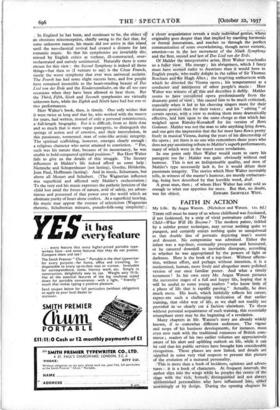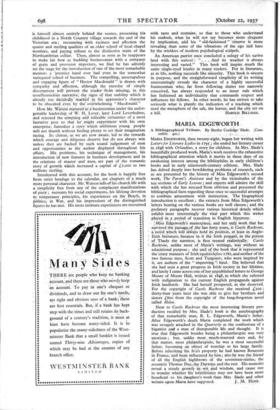FAITH IN ACTION
THERE still must be many of us whose childhood was fascinated, if- not fashioned, by a strip of vivid portraiture called : The Child—What Will He Become ? The modern palate, tickled by a subtler poster technique, may savour nothing quite so pungent, and certainly enjoys nothing quite so unequivocal as that double line of portraits depicting man's ascent and descent. No compromise was admitted. Either the infant was a top-liner, eventually prosperous and honoured, or he careered downhill to inevitable disrepute, according to whether he was appropriated by the powers of light or darkness. Here is the book of a top-liner. Without affecta- tion, without effort, and perhaps without intention, it is a modernised, human, more lively and altogether more polished version of our once familiar poster. And what a timely testament ! In his own story Mr. Angus Watson pictures the successive stages of a full and happy life, hoping that it Will be useful to some young readers "who know little of a phase of life that is rapidly passing." Actually, he doei much more. His book, which faithfully reflects his career, represc nts such a challenging vindication of that earlier training, that older way of life, as we shall not readily see provided -in so clearly cut a fashion elsewhere. • To those without personal acquaintance of such training, this essentially triumphant story may be the beginning of a revelation.
Many chapters in Mr. Watson's story are already widely known, if to somewhat different audiences. The vigour and scope of his business developments, for instance, must even now rank with the traditional romances of British com- nierce ; readers of his two earlier volumes are appreciatively aware of his alert and uplifting outlook on life, while it can be said that -his public services have brought him considerable recognition. Those phases are now linked, and details are supplied in some very vital respects to present this picture of the evolution of a matured personality.
This is more than a book of incidents, opinions and adven- tures : it is a book of characters. At frequent intervals the author slips into the wings while he peoples the centre of the stage with the' rich; bomelY; distinguished and not always unblemished personalities who have influenced him, eithd unwittingly or by design. During the opening chapters he is himself almost entirely behind the scenes, presenting his childhood in a North Country village towards the end of the Victorian era ; recounting' with raciness and affection the quaint and sterling qualities of an older school of local chapel worthies, and paying tribute to the distinctive traits of the Northumbrian collier. Then, almost as soon as he reappears to make his bow as budding businessman with a company of grain and provision importers, we find he has adroitly set the stage for the introduction of one of the most remarkable mentors a 'prentice hand ever had even in the somewhat variegated school of business. The compelling, unscrupulous and engaging figure of " Hector Macdonald " is drawn with sympathy and affection, although the exercise of simple discernment will 'prevent - the - reader-:froin • missing, in this unselfconicinns -.narrative; the signs of 'that stability which is already too decidedly 'inarked 'id his apprentice's character to be obscured even by the— oveiwhehning " Macdonald."
How Mr. Watson matured as a businessman tinder the unfor- gettable leadership of W. H. Lever, later Lord Leverhulme, and rejected the tempting and tolerable 'certainties of a most lucrative post so that he- might eiperinienr• with his own enterprise, furnishes a stOry- which' ambitious young people will not thumb without finding plenty to set their imagination racing. Its climax, as we are now aware, led to the rewards which courage and diligence deserve but do not always win unless they are backed by such sound judgement of men and opportunities as the author displayed throughout his affairs. His problems, his technique of management, his introduction of new features in business development and in the relations of master and men, are part of the romantic story of growth which increased a capital of £2,000 to two millions sterling.
Interleaved with this account, for the book is happily free from strict bondage to the calendar, are chapters of a much more personal character. Mr. Watson tells of his church life with a • simplicity free from any of the complacent manifestations of piety ; recounts his social experiments, his lifelong devotion to temperance principles, . his experiences on the Bench, in politics, in War, and : his impressions • of the distinguished figures he has met. His more intimate experiences are recounted with taste and restraint, so that to those who underStand his outlook, what' he will not say becomes more eloqUent by implication, aid -his ".` Old-fashioned " '`reserve is more revealing than some of the vibrations of the ego laid bare by the wielders of modern psychological scalpels. An American patriot once concluded -a eulogy of his native land with this naiveté : " . , And its weather is always interesting and varied." This book will inspire much the smile single-eyed loyalty in many readers. For in literature, as in life, nothing succeeds like sincerity. This book is sincere in purpose, and the straightforward simplicitY of its writing unassumingly reveals the character of a highly successful businessman who, far from following duties too narrowly conceived, has always responded to an inner rule which has fashioned an individuality that commands respect and influences his fellows. In other words, he has striven to take seriously what is plainly, the indication of a- teaching which used the metaphors of the salt, the leaven, and the city set on































































 Previous page
Previous page